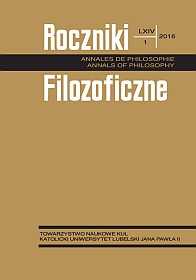The Influence of the Debate on “the Natural and the Artificial” on the Formation of Experimentalism
Abstract
One of the philosophical problems that developed on the basis of Aristotle’s philosophy of nature is the debate on “nature and art.” The formation of the experimental viewpoint which influenced the philosophical discussion and its criteria for distinguishing products of nature and products of art are also proposed as part of this debate. The purpose of this article is to elaborate on how the arguments surrounding “nature and art” influenced the experimental design of Robert Boyle’s philosophy of naturalism and the philosophical assumptions of modern experimentalism.
References
Arystoteles. Fizyka, przeł. Kazimierz Leśniak. Warszawa: Wdawnictwo Naukowe PWN, 2010.
Bacon, Francis. „Descriptio globi intellectualis”. W: The Works of Francis Bacon, red. James Spedding, Robert Leslie Ellis and Douglas Denon Heath, Tom 14. London: Longman, 1857–1874.
Bacon, Francis. „De augmentis scientiarum”. W: The Works of Francis Bacon, red. James Spedding, Robert Leslie Ellis and Douglas Denon Heath, Tom 14. London: Longman 1857–1874.
Bonawentura. „Commentaria w quatuor libros sententiarum magistri”. W: Petri Lombardi, Doctoris seraphici S. Bonaventurae Opera Omnia, Tom 2. Quaracchi: Collegii S. Bonaventurae, 1885–1902.
Boyle, Robert. „Origin of Forms and Qualities”. W: The Works of Robert Boyle, red. Michael Hunter i Edward B. Davis, tom 5. London: Pickering & Chatto, 2000.
Hacking, Ian. Representing and Intervening: Introductory Topics in the Philosophy of Natural Science. Cambridge: Cambridge University Press, 1983.
Hacking, Ian. „The Self-Vindication of the Laboratory Sciences”. W: Science as Practice and Culture, red. Andrew Pickering. Chicago: University of Chicago Press, 1992.
Hacking, Ian: „Eksperymentowanie a realizm naukowy”. W: Nowy Eksperymentalizm. Teoretycyzm. Reprezentacja, red. Danuta Sobczyńska i Paweł Zeidler. Poznań: Wydawnictwo IF UAM, 1994.
Hajduk, Zygmunt. „Przyroda, natura – tradycyjnie i współcześnie wiodące kategorie filozofii przyrody”. Analecta Cracoviensia 33 (2001): 51-70.
Halleux, Robert. Les Alchimistes grecs. Tome I: Papyrus de Leyde, Papyrus de Stockholm, Recettes. Paris: Les Belles Lettres, 1981.
Lombard, Piotr. W: Sentencje anielskie. Św. Izydor z Sewilli, Piotr Lombard, św. Tomasz z Akwinu, tłum. Jakub Szymański i Bogdan Burliga. Kraków: Wydawnictwo „M”, 2003.
Hetmański, Marek. „Rzeczywiste znaczenie naturalizmu w epistemologii”. Diametros 2005, 6: 173–181. DOI: 10.13153/diam.6.2005.178.
Newman, William R. „Technology and Alchemical Debate in the Late Middle Ages”. Isis 80 (1989), 3: 423-445.
Newman, William R. The “Summa Perfectionis” of the Pseudo-Geber: A Critical Edition, Translation, and Study. Leiden: Brill, 1991.
Newman, William R. Promethean Ambition: Alchemy and the Quest to Perfect Nature. Chicago: University of Chicago Press, 2004.
Pałubicka, Anna. „Naturalizm i antynaturalizm”. W: Filozofia a nauka. Zarys encyklopedyczny. Red. Zdzisław Cackowski, Jerzy Kmita, Klemens Szaniawski i Paweł J. Smoczyński. Wrocław, Warszawa, Kraków, Gdańsk, Łódź: Ossolineum, 1987.
Principe, Lawrence M. The Secrets of Alchemy. Chicago, London: The University of Chicago Press, 2013.
Zeidler, Paweł, Danuta Sobczyńska. „Koncepcja realizmu w Nowym Eksperymentalizmie a problem istnienia przedmiotów teoretycznych chemii”. W: Nowy Eksperymentalizm, Teoretycyzm, Reprezentacja, red. Danuta Sobczyńska i Paweł Zeidler. Poznań: Wydawnictwo IF UAM, 1994.
Copyright (c) 2016 Roczniki Filozoficzne

This work is licensed under a Creative Commons Attribution-NonCommercial-NoDerivatives 4.0 International License.





